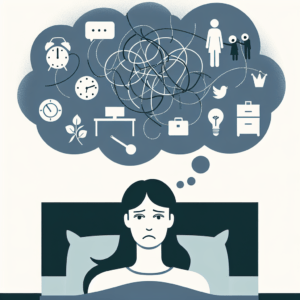Get your free Book Here

Dreaming of Death: What Your Subconscious is Trying to Tell You
We all find ourselves lost in a labyrinth of dreams at some point in our lives, navigating through the foggy realm of our subconscious. One of the more unsettling subjects we may encounter in our nightly escapades is the notion of death. For many, the simple act of dreaming about death is laden with fear, confusion, and anxiety. However, in the world of dreams, death often symbolizes transformation, change, and new beginnings.
As a life coach, I’ve witnessed firsthand how these dreams can affect people’s daily lives, inspiring a wave of emotional responses that can alter their perceptions of themselves and the world around them. In this blog post, we’ll dive deep into dreaming of death — exploring its meanings, implications, and what your subconscious is trying to communicate.
Let’s break this down into manageable sections, each highlighting crucial insights that can lead you toward understanding and growth.
1. The Nature of Dreams
Dreams have fascinated humanity for centuries, serving as portals to our hidden thoughts and feelings. They are not mere random images passing through our minds as we sleep; they reflect our experiences, beliefs, fears, and hopes. Particularly when life gets overwhelming, our subconscious tends to magnify our anxieties, shaping them into vivid scenarios that can include dreams of death.
In many psychological practices, particularly in Jungian psychology, dreams are seen as essential for communication between the conscious and unconscious mind. This communication can help us confront our deepest fears and desires. When it comes to death, it symbolizes endings, but also, as we’ll see, it can be an invitation for rebirth.
2. What Does Dreaming about Death Mean?
Dreaming about death can evoke feelings of dread, but it’s important to pause and reflect on what this may mean. Contrary to popular belief, dreaming of death does not necessarily foreshadow a physical death; rather, it can signify a variety of things, depending on your life circumstances.
Here are some potential interpretations:
-
Endings and Beginnings: Death in dreams often symbolizes an ending that paves the way for a new beginning. It may pinpoint a significant change or transition you are undergoing or are about to face in life.
-
Fear of Change: Humans tend to resist change, and dreams about death can surface our anxiety surrounding it. This fear could stem from anything, like changes in relationships, career, or personal growth.
-
Loss: If someone close to you has passed away recently, your dreams might reflect your grief or unresolved issues related to that loss.
Understanding the context of the dream — your emotions, life circumstances, and what’s currently transpiring in your waking life — can help you decode its essence.
3. The Psychological Perspective on Death in Dreams
From a psychological perspective, the concept of death in dreams can serve various functions. Sigmund Freud, the father of psychoanalysis, posited that dreams are a gateway to subconscious desires and fears. When it comes to death, Freud suggested that our aversion to acknowledging our mortality affects the subconscious’ desire to express these fears through dreams.
Carl Jung, on the other hand, viewed dreams as messages from the unconscious designed to aid in personal growth and maturity. A dream of death could indicate the need to acknowledge certain aspects of yourself that have been buried or overlooked.
Explore how your feelings toward death manifest in your dreams. Is it a representation of your aspirations left unfulfilled, unacknowledged fear, or a need for change? Instead of dismissing these dreams as nightmares, embrace them as opportunities for self-exploration.
4. Cultural Interpretations of Death in Dreams
Different cultures around the world have diverse beliefs concerning dreams and death. In some cultures, dreaming of death serves as a spiritual warning, while others view it as an omen of change or renewal. Understanding these cultural perspectives can enrich your comprehension of your own dreams.
For instance, in many Indigenous cultures, death dreams symbolize a call to personal evolution, signaling that a cycle has come to an end, and it is time to let go and move forward. In contrast, numerous Western beliefs can still evoke fear surrounding death, which may lead individuals to view these dreams with trepidation rather than as a pathway to regeneration.
Research cultural beliefs surrounding death and dreams to gain a multifaceted view and perhaps a new context for your experiences.
5. Journaling Your Dreams
One of the most powerful tools in deciphering your dreams lies in journaling. Keeping a dream journal can help you document your experiences while they’re fresh in your memory. Reflecting on recurring themes, symbols, and feelings associated with your dreams can illuminate patterns connected to your waking life.
When documenting your dreams about death, consider writing down the entire narrative and your emotions throughout the dream. The surrounding context is vital—who was present? What feelings arose during these dreams? Were there significant life events occurring? By connecting the dots, you’ll likely be able to pinpoint the underlying concerns or changes your subconscious is urging you to confront.
6. Embracing Transformation
While dreaming about death can be emotionally charged, it is essential to embrace the transformative nature of these dreams. Change, no matter how daunting, is a vital part of life. Therefore, interpreting death in your dreams as an agent of transformation can help you navigate personal growth more smoothly.
Allow yourself to accept the message within these dreams. What aspect of your life is calling for change? Is it your career, relationships, or self-image? Adopting a mindset that views death as an opportunity for growth can be liberating. By embracing these notions, you can embrace the very transformation that your subconscious is urging you to embrace, leading to a more fulfilling life.
7. Techniques for Managing Anxiety About Death
If dreaming about death stirs feelings of anxiety—this is normal. Many grapple with mortality and the transformations it entails. Here are some techniques to help you manage any fears surrounding death and enhance your mental wellness:
-
Mindfulness Meditation: Practicing mindfulness helps you stay grounded in the present moment. Accepting thoughts and feelings of fear without judgment can help you build resilience in the face of unsettling dreams.
-
Breathing Exercises: When anxiety surges, practicing deep breathing techniques can help calm your mind and body. This technique can serve as an immediate tool to counteract anxiety following a particularly distressing dream.
-
Professional Guidance: If your dreams significantly impact your waking life, consider speaking with a therapist or counselor. Professional support can aid in processing emotions and fears tied to dreams and can teach you healthy coping mechanisms.
8. Seeking Clarity Through Reflection
Ultimately, clarity often comes through reflection. Fostering self-awareness allows for deeper understanding, reducing the fear that dreams may invoke. Spend time considering the symbolic meanings behind your dreams—what could they unveil about your thoughts, feelings, and desires?
Engaging in a practice of self-inquiry can provide you the insight you need to align with your true self. Reflect on guiding questions such as:
- What fears or anxieties am I currently grappling with?
- Do I have unfinished relationships or unresolved grief in my life?
- What positive changes can I embrace moving forward?
Such inquiry opens avenues for personal growth and understanding, allowing the dream of death to empower you rather than hinder your progress.
Conclusion
In conclusion, while the sensation of dreaming about death may elicit fear, it is crucial to explore the meanings embedded within this experience. Dreams are powerful messengers from your subconscious, guiding you through your unique journey of self-discovery and transformation. By analyzing and reflecting on these dreams, you can tap into profound insights that pave the way for personal growth and renewal.
Fear not the dreams of death; instead, treat them as opportunities to dive deeper into the richness of your life experience. Embrace transformation as a fundamental part of your journey, and learn to welcome the changes that are inevitable. Life, as we experience it, is a continuous cycle of endings and beginnings. By learning to navigate the intricacies of dreams, you can embody a more profound understanding of yourself and lead a more fulfilling life.
FAQs
Q1: Does dreaming about death mean someone is going to die?
A1: Not necessarily. Dreaming of death often symbolizes change, transformation, or the end of a chapter rather than an omen of physical death.
Q2: Should I be worried if I constantly dream about death?
A2: Recurrent dreams about death may indicate that your subconscious is trying to signal unresolved fears, anxieties, or the need for change in certain areas of your life. Consider journaling and seeking professional guidance if these dreams disturb you.
Q3: How can I decipher my dreams?
A3: Keeping a dream journal can help! Write down your dreams upon waking, noting details and emotions. Reflect on the meanings and how they relate to your waking life.
Q4: Does everyone dream of death at some point?
A4: Many people do experience dreams of death, especially during times of change or crisis, but the frequency and significance will vary from person to person.
Q5: What should I do if a dream about death frustrates or scares me?
A5: Engage in calming practices such as mindfulness meditation, journaling about your feelings, or talking to someone about your experience. Understanding and processing your feelings can help alleviate emotional distress.
Instantly Access Your Free Children’s Books Here! (https://payhip.com/BlueCherryStore) – Disclaimer: I may earn a commission from qualifying purchases as an affiliate. Please note that I only recommend products I believe will provide value to my readers.(M)







